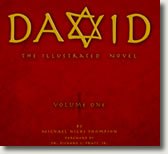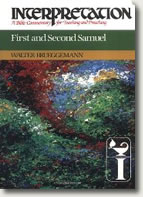God's Chosen
 Then all the corrupt and worthless fellows among the men who had gone with David said, "Because they did not go with us, we will not give them any of the spoil that we have recovered, except that each man may take his wife and children, and leave." But David said, "You shall not do so, my brothers, with what the Lord has given us; he has preserved us and handed over to us the raiding party that attacked us. Who would listen to you in this matter? For the share of the one who goes down into the battle shall be the same as the share of the one who stays by the baggage; they shall share alike." From that day forward he made it a statute and an ordinance for Israel; it continues to the present day. —1 Samuel 30: 22-25
Then all the corrupt and worthless fellows among the men who had gone with David said, "Because they did not go with us, we will not give them any of the spoil that we have recovered, except that each man may take his wife and children, and leave." But David said, "You shall not do so, my brothers, with what the Lord has given us; he has preserved us and handed over to us the raiding party that attacked us. Who would listen to you in this matter? For the share of the one who goes down into the battle shall be the same as the share of the one who stays by the baggage; they shall share alike." From that day forward he made it a statute and an ordinance for Israel; it continues to the present day. —1 Samuel 30: 22-25
Much of David’s story thus far has centered around the demise of Saul and his seemingly endless efforts to derail the ascendancy of David, God’s anointed successor to his throne. Yet in this episode, Saul is not the antagonist. David must confront problems caused by some of his own followers.
The troublemakers amongst David’s fighters are those unwilling to share the spoils of their victory over the Amalekites with their comrades who were too fatigued to join in the battle. This is not just a problem of greed; these fellows are in effect saying that the men who remained behind are of no value, that the victors on the battlefield are the only ones who matter, and that looking out for oneself means ignoring the needs of comrades whose strength has waned. David’s response to their demands is unequivocal, generous and wise.
Without hesitation, David squarely gives credit to God for the crushing defeat of the Amalekites, stating that no one is to hoard those things that God has given. The warriors will share the spoils of war with those who stayed behind, and David himself will send portions of the booty to “his friends, the elders of Judah, saying, ‘Here is a present for you from the spoil of the enemies of the Lord.’” (1 Samuel 30:26). It is no doubt a politically savvy move, something Walter Brueggemann calls “calculating generosity.” Brueggemann continues, “David is marvelously presented as a giver, not a taker. It is his propensity to give that makes his new kingship possible.”
Scripture lauds David's response as the beginning of a new way. Share and share alike will become a statute governing Israel from that day forward. The equitable distribution of goods thus becomes part of David’s legacy.
Moreover the David presented here is mindful of his actions on a personal as well as corporate level. Even as he is rejecting the demands of his self-centered warriors, David calls these men his brothers, claiming kinship along with authority. We see here a compassionate, intelligent and just leader whose decisions and behavior are rooted in faith. This is David shown at his best, the chosen one, simultaneously bowing to God and leading his people.
Although it is quite risky to advise others, I would say that a person should always be ready for the challenges of faith, ready for situations in which you have to show what you really believe in. Prosperity can create illusions. A Christian should use prosperity to prepare for a crisis, a crisis no one can evade. I would say to North Americans: be thankful for your opportunities, and ask yourselves: are you making sufficient use of these opportunities as a chance to grow spiritually?
Justice, and only justice, you shall pursue, so that you may live and occupy the land that the Lord your God is giving you. —Deuteronomy 16:20
The will of the Father is pretty much spelled out in The Sermon on the Mount: strive for justice among all people, treat others as you want to be treated, and when you pray say, ‘thy will be done.’ That, as we know, is a huge order in itself. And it is enough.
I have three precious things which I hold fast and prize. The first is gentleness; the second is frugality; the third is humility, which keeps me from putting myself before others. Be gentle and you can be bold; be frugal and you can be liberal; avoid putting yourself before others and you can become a leader among men. —Laozi
Those who are wise shall shine like the brightness of the sky, and those who lead many to righteousness, like the stars forever and ever. —Daniel 12:3
I'm still discovering, right up to this moment, that it is only by living completely in this world that one learns to have faith. I mean living unreservedly in life's duties, problems, successes and failures, experiences and perplexities. In so doing, we throw ourselves completely into the arms of God. — Dietrich Bonhoeffer


